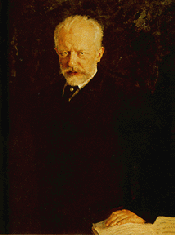Characters
| Lisa, the Countess’ grandaughter | Soprano |
| Gherman (or Herman), an army engineer | Tenor |
| Prince Yeletsky, an officer, Lisa’s fiancé | Baritone |
| Count Tomsky, an officer | Baritone |
| The Countess, called the Queen of Spades | Soprano or Mezzo-Soprano |
| Polina (or Paulina), Lisa’s friend | Mezzo-Soprano |
Synopsis
Act One
Scene One
Herman is considered to be an outsider by the circle of officers around Tomsky, Sourin and Tchekalinsky. For some time now he has spent night after night at the gambling table, merely watching what is going on in silence. He tells Tomsky in confidence that he has fallen in love with a beautiful young noblewoman, but does not know her name. As Herman is poor and below her in station, he fears that she will prove to be beyond his reach. Prince Yeletsky introduces Tomsky and his friends Sourin and Tchekalinsky to his fiancée, Lisa. Herman recognises her as his own beloved. The old Countess, Lisa's grandmother, and Lisa herself both exclaim when they catch sight of Herman.
Prince Yeletsky, Tomsky and Herman are also struck by an inexplicable fear.
Prince Yeletsky moves away with the ladies and Tomsky tells his friends the rumours surrounding the old Countess. The Countess was a beauty when she was young and lived in Paris, where she was referred to as the "Venus from Moscow". One day she lost all her money at the gambling table. The Count Saint-Germain offered to reveal to her the secret of the three cards with which she could win back her fortune if she would grant him a rendezvous and she agreed. She subsequently passed on the secret of the three cards to two other people but now she guards it carefully. She was warned in a dream that she would die at the hands of the third man who tried desperately to win the secret of the three cards from her. Herman is fascinated by the story. He sees how he can acquire money and respect and then win Lisa.
Scene Two
Lisa's friends are celebrating her engagement to Prince Yeletsky in the Countess’s house, but Lisa is sad and thoughtful. Ever since she first met Herman she has felt irresistably attracted to him. When Lisa's friends have left, Herman appears in her room and declares his love for her. Lisa is desperately torn between her sense of duty and her inclination. When Herman threatens to kill himself if she spurns him she feels duty-bound to admit that she loves him.
Act Two
Scene Three
At the ball Prince Yeletsky begs Lisa to tell him what is troubling her. He assures her of his love but at the same time is aware of a great feeling of strangeness between them.
Lisa sends Herman a note in which she asks him to meet her after the performance of the pastoral The Faithful Shepherdess. In this intermezzo, Chloe has to choose between two men, Daphnis, a poor shepherd, and Plutus, a rich merchant. She decides in favour of her love for Daphnis, although it will mean a meagre existence in future. After the performance Lisa gives Herman a key with which he will be able to gain access to her own apartments through the bedroom of the Countess. Herman interprets this as a sign; he is now determined to get the secret of the three cards from the Countess at all cost.
Scene Four
Herman hides in the Countess's bedroom. The Countess herself comes in with her maids and attendants, whom she soon sends away. Herman approaches her and begs her to tell him the secret of the three cards. When she remains silent, Herman threatens her with a pistol in his desperation, and the Countess dies of shock at the sight of the weapon. Lisa appears on the scene and is forced to realise that Herman has only come because of the cards and not because of her. She also believes that he has killed her grandmother.
Act Three
Scene Five
Lisa has sent Herman a letter in which she forgives him and asks him to meet her at midnight. Herman is obsessed by memories of the Countess's funeral. Suddenly the ghost of his victim appears and reveals the secret of the three cards: Three, Seven, Ace.
Scene Six
Lisa is prepared to elope with Herman. When he finally appears, the only thing he can think of is going to the gaming-house. In his obsession he pushes Lisa aside, not even recognising her any longer, and goes off. Lisa can see no other way out and commits suicide.
Scene Seven
The mood is boisterous in the gaming-house. Prince Yeletsky tells Tomsky that his engagement to Lisa has been broken and that he is seeking revenge on his rival, Herman. Herman arrives and immediately begins to play for high stakes. He wins with his first card, the three, and also with his second, the seven. In the third game only Prince Yeletsky dares to play against him and Herman stakes all the money he has won on the third card, the ace. It is, however, not an ace but the Queen of Spades which he turns over. Again he sees the ghost of the old Countess, whose smile seems to be mocking at him, and kills himself. With his dying breath he asks for the Prince's pardon and sees Lisa's ghost, who forgives him.
[Synopsis courtesy of Bayerische Staatsoper]
Click here or here for the complete text of Pushkin’s The Queen of Spades.
